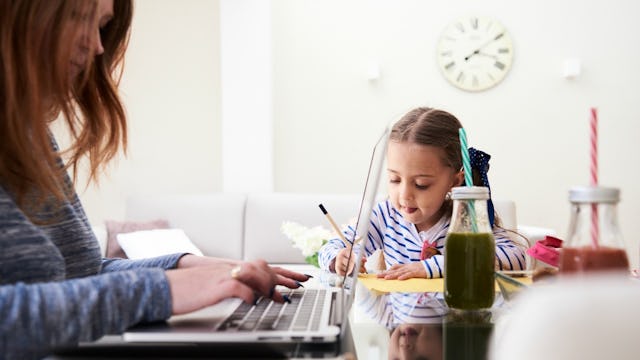Anxiety Medication Helps Me Survive As A Working Mom, And This Is Why

For me, working motherhood is better when I’m on drugs.I ‘m not talking about the kind of drugs that make you high, but instead the kind that keep you sane.
I am a better mother, wife, and employee when I’m on Zoloft.
I’ve always been an anxious person. When I was a teenager, I remember my parents suggesting I try some kind of anxiety medication to take the edge off. At that time I scoffed at their suggestion. And then I went to college and realized that many, if not most, of my friends had as much anxiety as I did.
Into my adulthood, my anxiety ebbed and flowed.
So it should have come as no surprise to me that after I had my first daughter at the age of 29, I began to have some postpartum anxiety.
But somehow it snuck up on me. See, it wasn’t the normal PPD or PPA that the hospital brochures describe. I never even had the “baby blues.” Honestly, motherhood was a huge blessing to me and caring for my newborn came easier to me than I expected. She was a dream baby and the first few months, although exhausting, were a breeze.
Then I had to go back to work. And postpartum anxiety hit me like a ton of bricks.
I cried myself to sleep almost every night of my last two weeks of maternity leave. When I finally went back to work, I was an emotional and mental mess. I had baby brain. I didn’t feel like I fit in anywhere except for at home with my husband and our new baby. Even going out to dinner with friends was an exhausting chore. Every minute I didn’t spend with my daughter, I felt crushing guilt.
And when she got sick, it was like the world was ending. And, spoiler alert, babies get sick a lot. So I was breaking down quite a bit.
Around my daughter’s first birthday, my anxiety spiraled out of control. My husband and I had a special trip planned for just the two of us when our daughter would be 13 months old. When she got sick with a stomach bug around her 1st birthday, I flat out told my husband I wasn’t going to go on our trip. We fought for days. I lost my mind. I couldn’t bear the thought of leaving our daughter for a few days/nights.
I ended up going on the trip and everything was fine, but I still had the nagging anxiety.
Finally, around 18 months, I started to feel like myself again.
That’s when I finally realized that all of my worry, my guilt, my freak outs, had been postpartum anxiety. It was really normal, but it could have been helped.
So when I got pregnant with our second daughter about six months later — a pregnancy that proved to be high risk and very emotional — I vowed that I would stop my own insanity.
Around 8 weeks postpartum on my second go-round, I began taking a low dose of Zoloft. And I am so thankful I did that for myself and my sanity.
Since having my second daughter, I have rarely had any helpless thoughts or bouts of “not feeling like myself.”
When my second daughter was around a year old, I tried to wean myself off Zoloft and immediately regretted it. Most of all, my work suffered because I found I was more irritable, less willing to help co-workers, and more stressed about petty things.
At that point, my husband said to me, “Why bother? If it makes you feel better, than it’s worth it.”
Listen, I don’t love the fact that I have to take a pill every.single.day of my life, but I understand that it makes me a more patient mother, a more loving wife and a less stressed co-worker.
I understand that at this point in my life, it might be necessary to help keep me feeling “normal.”
Motherhood is hard. Working full-time and trying to grow a career is stressful. Put those two things together, and add trying to be a loving, supportive wife, and it can be a recipe for a breakdown — with or without anxiety.
So my point is, don’t wait until it’s too late. Take a lesson from me, if you need help, ask for it. Because everyone deserves to live a happy, (somewhat) sane life — even working mothers.
This article was originally published on